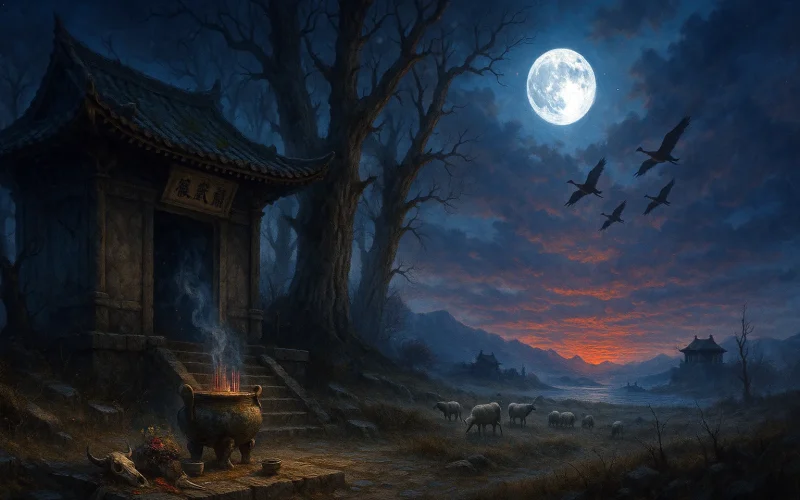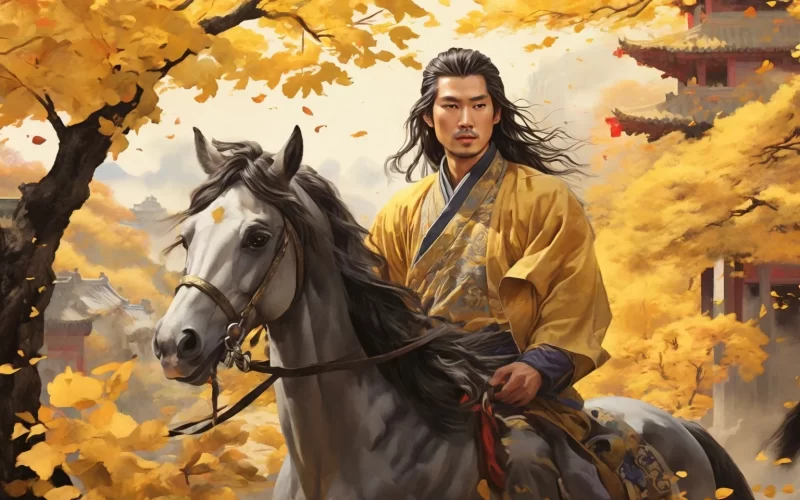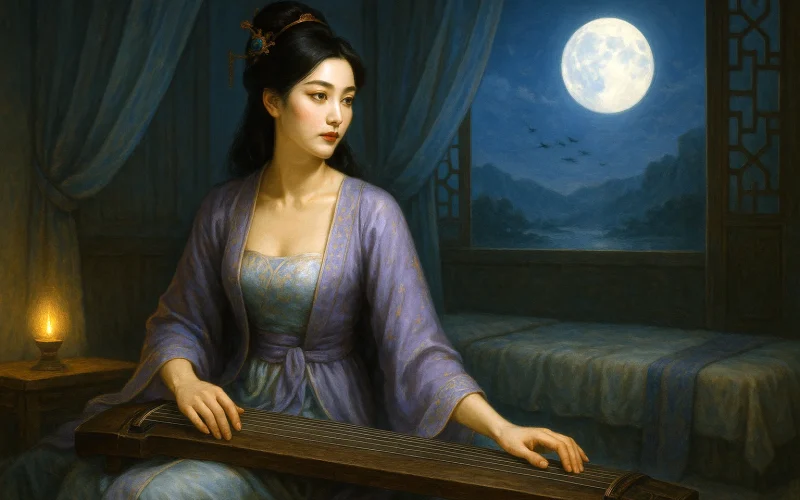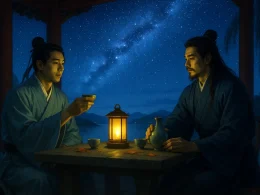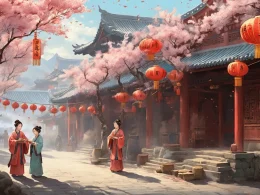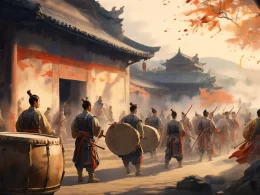Though our envoy, Su Wu, is gone, body and soul,
This temple survives, these trees endure...
Wildgeese through the clouds are still calling to the moon there
And hill-sheep unshepherded graze along the border.
...Returning, he found his country changed
Since with youthful cap and sword he had left it.
His bitter adventures had won him no title...
Autumn-waves endlessly sob in the river.
Original Poem
「苏武庙」
温庭筠
苏武魂销汉使前,古祠高树两茫然。
云边雁断胡天月,陇上羊归塞草烟。
回日楼台非甲帐,去时冠剑是丁年。
茂陵不见封侯印,空向秋波哭逝川。
Interpretation
This poem was composed during the late Tang Dynasty, a period marked by political turmoil and ethnic tensions. While paying homage at the Temple of Su Wu, Wen Tingyun expressed his admiration for loyal ministers' righteousness through lamenting the past and grieving the present, while also conveying his personal frustration over unrecognized talents and concern for his country and people. The poem's subject, Su Wu, was a famous Han Dynasty envoy detained by the Xiongnu for nineteen years. He remained unyielding, herding sheep by the North Sea until finally returning to Han territory, becoming one of Chinese culture's spiritual symbols. Late Tang literati often wrote poems mourning antiquity to express contemporary concerns, and Wen Tingyun's work belongs to this tradition.
First Couplet: "苏武魂销汉使前,古祠高树两茫然。"
Sū Wǔ hún xiāo hàn shǐ qián, gǔ cí gāo shù liǎng máng rán.
Before Han envoys Su Wu nearly fainted from emotion;
Now ancient temple and tall trees stand in silent communion.
The opening couplet presents the climactic moment of Su Wu's story, using "soul-wrenching" to depict his complex emotions. "Ancient temple and tall trees" shifts from present to past, evoking endless reverence from later visitors.
Second Couplet: "云边雁断胡天月,陇上羊归塞草烟。"
Yún biān yàn duàn hú tiān yuè, lǒng shàng yáng guī sāi cǎo yān.
Moon over barbarian sky where border geese vanish;
Sheep returning through smoky grass on northern ranges.
These parallel lines create two scenes: one showing Su Wu gazing at the moon longing for home, the other depicting his nineteen years of herding. Blending emotion with scenery, they convey extreme isolation and perseverance.
Third Couplet: "回日楼台非甲帐,去时冠剑是丁年。"
Huí rì lóu tái fēi jiǎ zhàng, qù shí guān jiàn shì dīng nián.
Returning, he found palaces without royal tents;
Departing, his cap and sword marked youth's prime.
The stark contrast between "return" and "departure" highlights Su Wu's nineteen-year steadfastness and the melancholy of changed circumstances, evoking profound historical and existential pathos.
Fourth Couplet: "茂陵不见封侯印,空向秋波哭逝川。"
Mào líng bú jiàn fēng hóu yìn, kōng xiàng qiū bō kū shì chuān.
No ennobling seal at Maoling's vanished tomb -
Only autumn waves to mourn time's current.
The conclusion deepens the theme: though honored upon return, Su Wu lost his sovereign's recognition. His loyalty finds no recipient but the flowing river - profoundly moving.
Holistic Appreciation
Centered on Su Wu's Temple, the poem immediately presents the climactic "soul-wrenching" moment, compressing nineteen years of hardship into emotional intensity. Shifting from temple scenery to historical memory, it alternates between two scenes - moon-gazing homesickness and sheep-herding routine - exhaustively portraying Su Wu's endurance and national integrity. The third couplet's "return/departure" contrast outlines time's passage and life's vicissitudes. The finale directly expresses grief, transforming "autumn waves" and "time's current" into silent historical witnesses for Su Wu's loyalty and the poet's reflections.
Structurally interlocking, linguistically refined and profoundly suggestive, the poem uses mourning Su Wu to comment on contemporary issues, expressing respect for loyal righteousness and personal aspirations, making it representative of late Tang poetry.
Artistic Merits
Though compact, the poem achieves remarkable depth through concise language, rigorous structure and sincere emotion, fully demonstrating Wen Tingyun's artistic mastery as a late Tang luminary. Skillfully employing traditional elegiac techniques, he uses the temple's past-present contrast to express admiration for Su Wu's steadfast character while conveying his own patriotic concerns. Following a temporal thread, it begins with Su Wu meeting Han envoys, describes the temple's current state, recalls nineteen years of hardship through geese, moon and herding scenes, then transitions to homecoming regrets before concluding with "mourning time's current." The emotional progression and circular structure unfold like layered historical scrolls.
Insights
In "Su Wu's Temple," Wen Tingyun uses extraordinarily concise language and profound emotion to portray an unyielding national hero, celebrating moral integrity while expressing his own longing for ideal governance and loyal character. Using antiquity as mirror to reflect on reality, the poet awakens readers to cherish faith, integrity and mission. Today, it still offers profound enlightenment about perseverance, conviction, national spirit and cultural roots.
Poem translator
Kiang Kanghu
About the poet
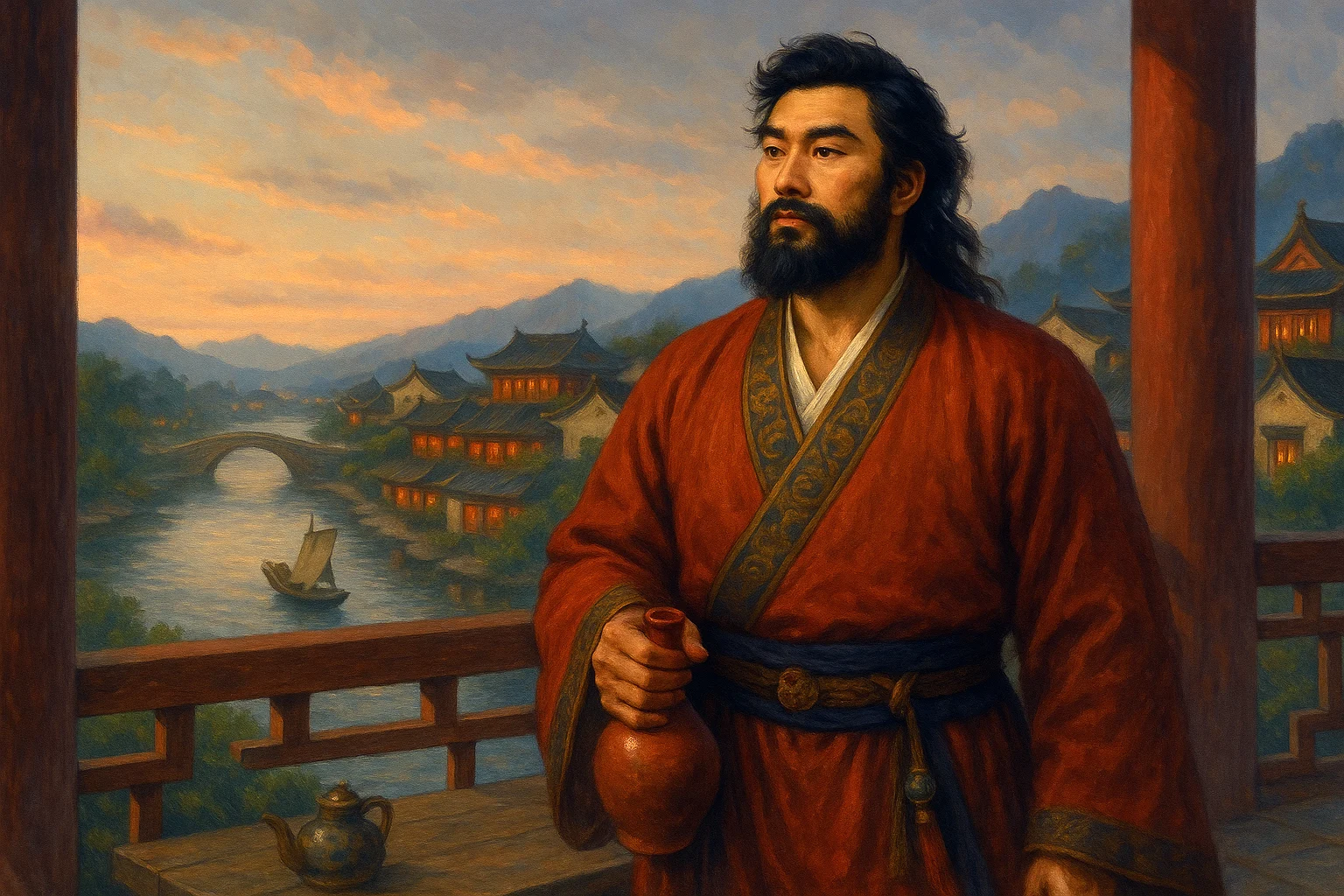
Wen Ting-yun (温庭筠) was a native of Qixian County, Shanxi, circa 813-870 AD. Wen Tingyun was a professional writer of late Tang Dynasty lyrics, whose achievements and influence were greater than that of poetry, and was once known as the “originator of the flowers”.






